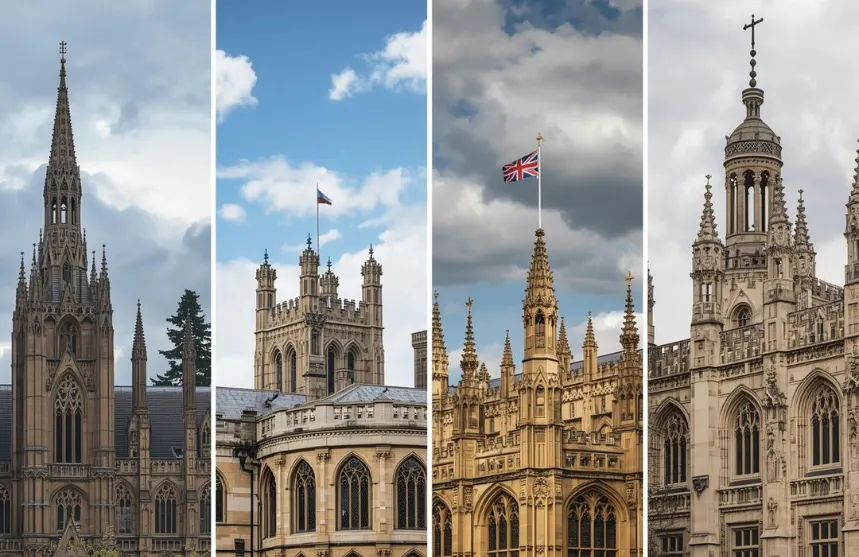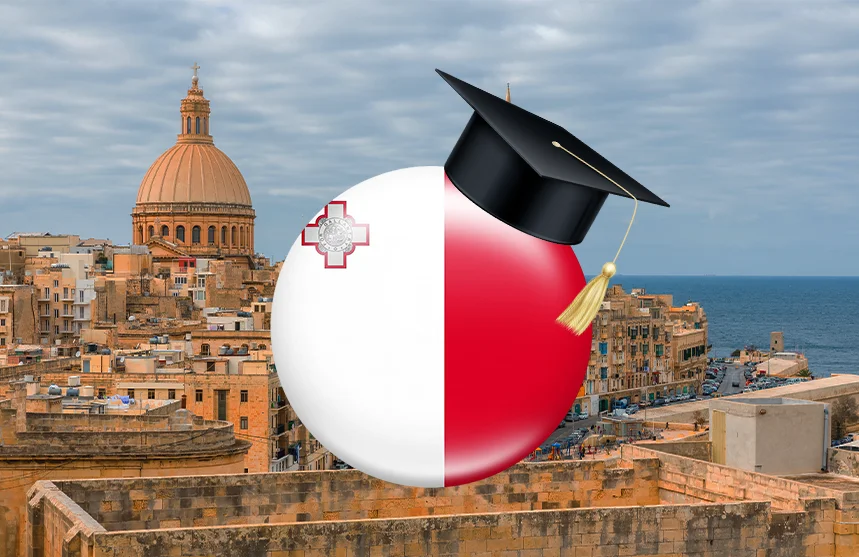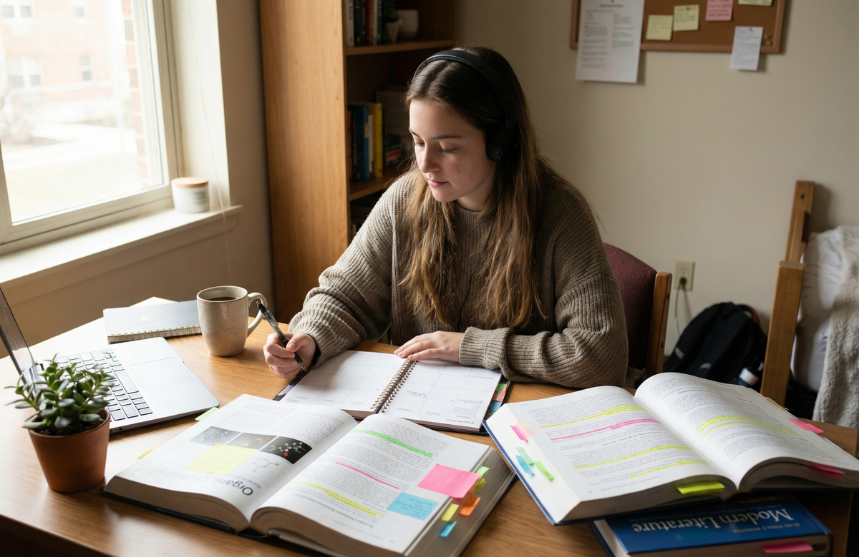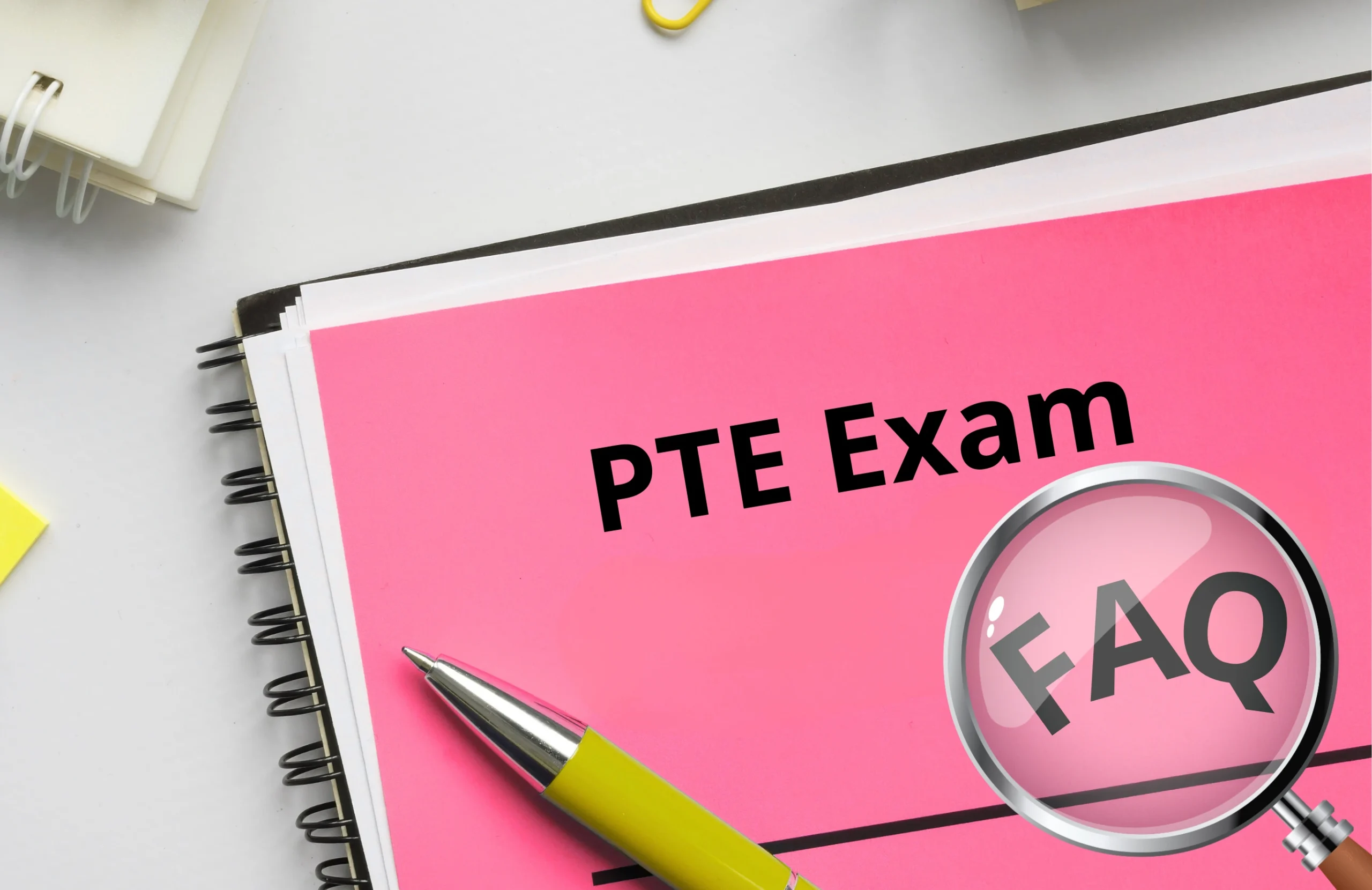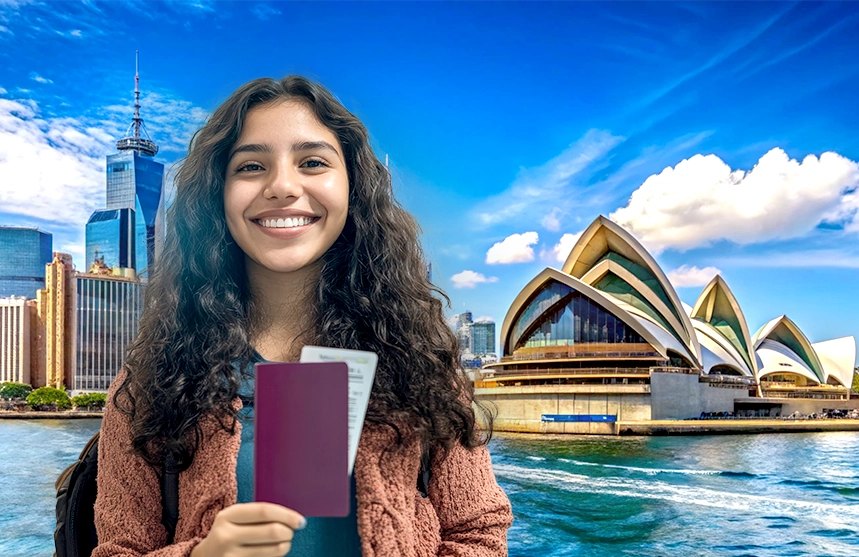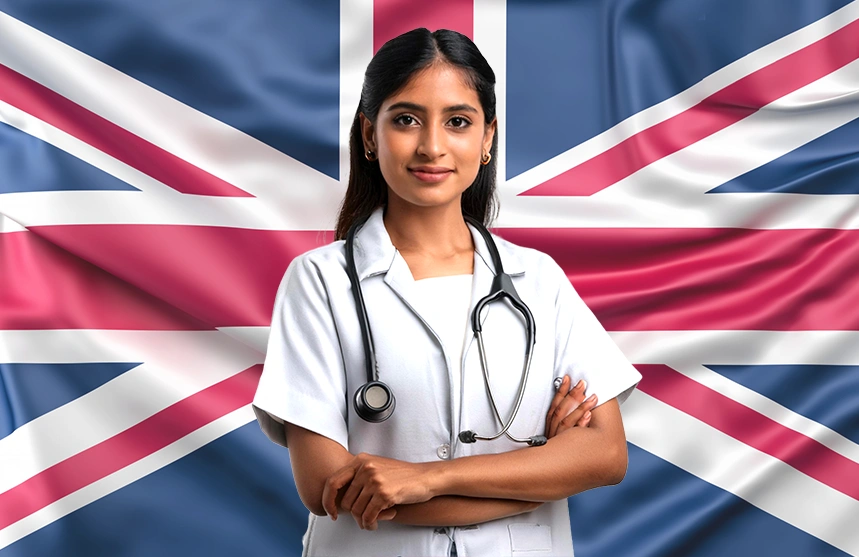Hotel Management Scope Overseas: Courses, Skills, Internships & Global Careers Explained
Study MBBS in Caribbean Island: Your Gateway to a Global Medical Career

Want to be a doctor without burning a hole in your pocket?
Looking for a globally recognised MBBS degree that doesn’t demand sky-high NEET scores or exorbitant fees? If your answer is yes, Studying MBBS in the Caribbean Islands might just be the life-changing decision you’ve been searching for.
Caribbean Medical Universities have gradually become one of the most lucrative alternatives over the last decade to traditional destinations such as the US, UK, and India. With a low-cost fee structure, US-based curriculum, high USMLE first-time pass rates, and English-taught programmes, the Caribbean is now increasingly sought after by thousands of Indian and international students.
Read on to discover everything you need to know about pursuing MBBS in the Caribbean, its advantages, costs, top schools, eligibility, visa process, and more.
Why Study MBBS in the Caribbean Islands?
When it comes to choosing a destination to study medicine, a growing number of students are actively exploring alternatives to conventional destinations such as India, the US, or the UK. And they’re doing so for all the right reasons. So what makes Studying MBBS in the Caribbean such a smart and attractive option? Let’s find out.
1. Globally Recognised US-Based Curriculum
The US-modeled curriculum is one of the standout features of Caribbean medical universities. Most schools in the region offer an MD (Doctor of Medicine) degree instead of the traditional MBBS. However, the MD is considered equivalent and is recognised in India, the US, Canada, and several other countries. The curriculum aligns with the USMLE (United States Medical Licensing Examination) structure and emphasises case-based learning, clinical reasoning, and strong foundational sciences. Graduates are well-prepared to care for diverse patient populations and pursue advanced medical training globally.
2. High USMLE Pass Rates and Residency Success
A significant draw is the high pass percentage in the USMLE Step 1 and Step 2 exams. Top Caribbean universities often have pass rates above 90%, reflecting their academic rigor and faculty quality. Many graduates secure residencies in competitive specialties across the US and Canada, proof that Caribbean-trained physicians are not only competent but also successful in international medical practice.
3. No Capitation or Donation Fees
Unlike private medical colleges in India that charge hefty capitation or donation fees, Caribbean universities follow a transparent, merit-based fee structure. There are no hidden costs, making quality medical education more affordable and ethical. What you see is what you pay, ideal for long-term financial planning.
4. English as the Medium of Instruction
Language will never be a barrier when studying MBBS in the Caribbean. Most universities teach entirely in English, ensuring smooth communication with faculty, peers, and clinical supervisors. This is particularly beneficial for Indian and international students who are already accustomed to English-medium education. It also facilitates preparation for global licensing exams and ensures familiarity with international medical terminology.
5. Easy and Hassle-Free Admission Process
The admission process to Caribbean medical schools is refreshingly simple. Unlike countries where exams like the MCAT, SAT, or IELTS are mandatory, most Caribbean universities have straightforward requirements. Indian students only need to clear NEET. With multiple intakes throughout the year and fast application processing, students avoid long waiting periods and excessive competition. This flexibility makes the Caribbean a great choice for those who missed admission rounds elsewhere.
Admission Requirements for Indian Students
To pursue MBBS in the Caribbean Islands, Indian students must fulfill the following:
- 12th-grade PCB (Physics, Chemistry, Biology) from a recognised board
- Minimum of 50% aggregate in PCB
- NEET qualification (as per NMC rules)
- Valid passport and US student visa
Documents Required
Here’s a basic list of documents needed to apply:
- Academic transcripts (10th and 12th marksheets)
- Valid NEET scorecard
- Passport-size photographs
- Valid passport
- Medical fitness certificate
- Statement of Purpose (SOP)
- Bank statements or financial affidavit
- Admission letter, visa application, etc.
Student Visa Process for MBBS in the Caribbean
Getting a student visa to study MBBS in the Caribbean is simple and stress-free. Here’s a step-by-step guide:
Apply and Get Offer Letter
Submit your application to the Caribbean medical school of your choice, along with your NEET scorecard, passport copy, and other required documents.
Pay Initial Tuition Deposit
Once accepted, pay the first tuition fee installment as specified by the university. This confirms your seat and is a mandatory step in the visa process.
Prepare and Submit Visa Application
Start your visa application using the offer letter and tuition payment receipt.
Attend Visa Interview (if applicable)
Some Caribbean countries may require an interview (in-person or online). Be prepared to answer questions about your academic plans, financial readiness, and choice of university.
Get Your Visa and Book Travel
After approval, you’ll receive a physical visa stamp or an e-visa, depending on the country’s process.
What Comes After MBBS in the Caribbean?
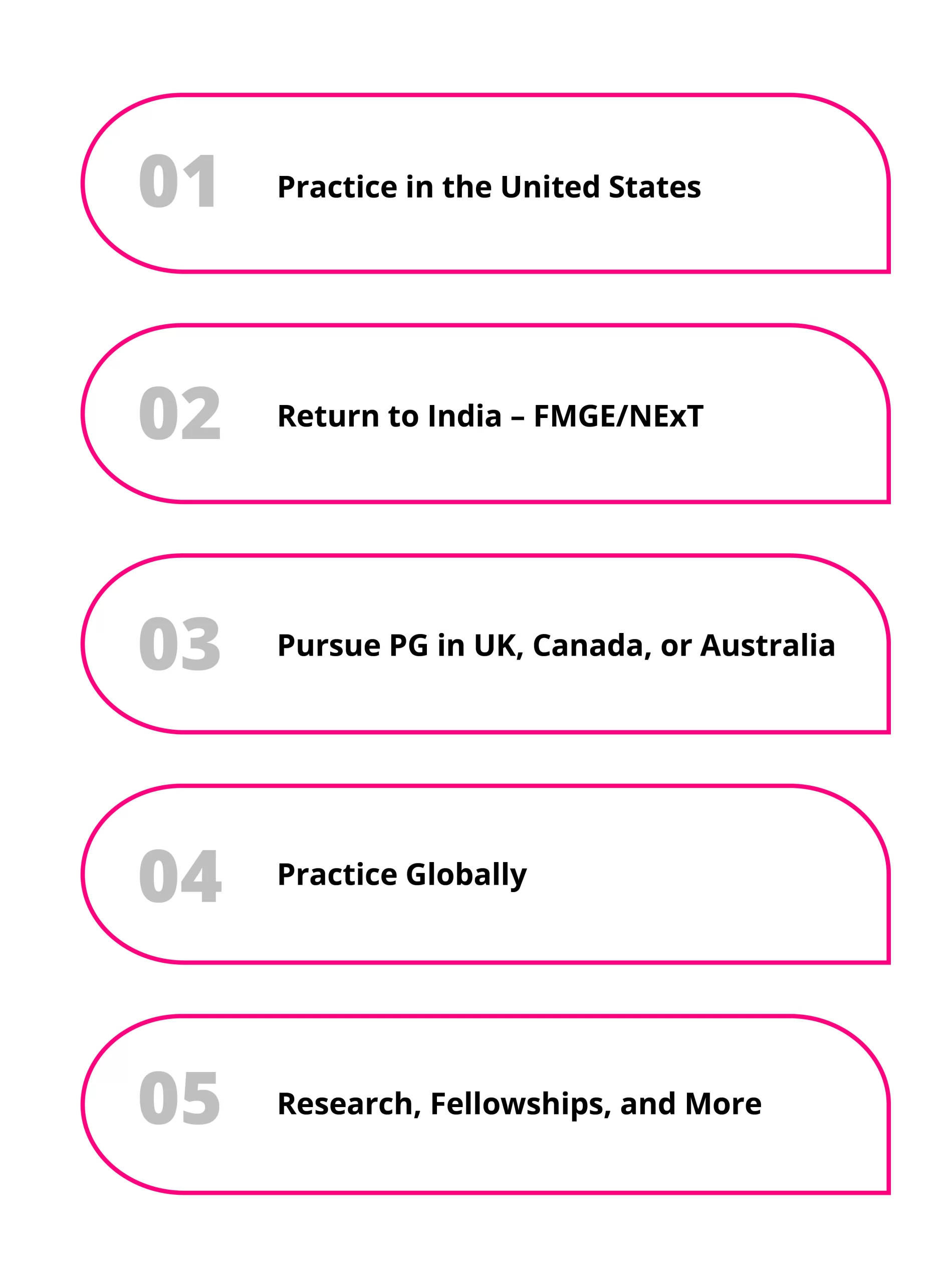
Studying MBBS in the Caribbean opens doors to a global medical career. Here are the post-MBBS pathways:
1. Practice in the United States
Since many Caribbean universities are USMLE-focused, graduates can apply for US residencies via the NRMP. After residency, they can take licensure exams and practice in the US.
2. Return to India – FMGE/NExT
Indian students must pass the FMGE or NExT exam to practice in India. Most Caribbean universities offer support for these exams. After passing and completing your internship, you can register with the NMC.
3. Pursue PG in UK, Canada, or Australia
Graduates can also pursue postgraduate education in the UK (via PLAB), Canada, or Australia, subject to meeting the respective entry and exam requirements.
4. Practice Globally
You may also explore job opportunities in the Middle East, Africa, Europe, and more, provided your university is listed in the World Directory of Medical Schools (WDOMS).
5. Research, Fellowships, and More
Caribbean graduates can also apply for research positions, clinical fellowships, or academic roles at global institutions.
Life in the Caribbean as a Medical Student
Studying MBBS in the Caribbean blends academic intensity with a relaxed island lifestyle. Universities are located in peaceful, safe regions with modern campuses and up-to-date facilities. The tropical climate provides a refreshing change from the usual, and students enjoy outdoor activities like beach sports, hikes, and exploring the natural beauty of the islands.
You’ll study in a multicultural environment, interacting with peers from across the globe. The Caribbean is a melting pot of cultures, and students benefit from rich cross-cultural experiences. The local communities are friendly, and the student bodies are close-knit and supportive. It’s the perfect mix of focused academics and a vibrant student life.
Conclusion
Studying MBBS in the Caribbean is not a fallback option, it’s a future-ready decision. With globally recognised MD degrees, US-based curricula, excellent USMLE success rates, and affordable costs, Caribbean medical universities are paving the way for the doctors of tomorrow. Whether your goal is to work in the US, return to India, or pursue PG abroad, the Caribbean sets the right foundation.
MetaApply IE simplifies the entire study abroad journey, from shortlisting countries and universities to visa guidance, SOP assistance, and post-admission support. Our experienced advisors help you find the right Caribbean medical university that fits your goals, interests, and budget. Ready to take your first step toward a global medical career? Let MetaApply IE be your trusted partner on this journey.
Frequently Asked Questions
Yes, as long as the university is listed in the World Directory of Medical Schools (WDOMS) and recognised by the National Medical Commission (NMC). Indian students must also pass the FMGE or NExT exam to practice in India.
Absolutely. Most Caribbean universities follow the US-based MD program and prepare students for USMLE Step 1 and 2, making them eligible for US residency programs.
NEET is not required for admission, but Indian students must be NEET-qualified if they plan to return and practice in India, as mandated by the NMC.




